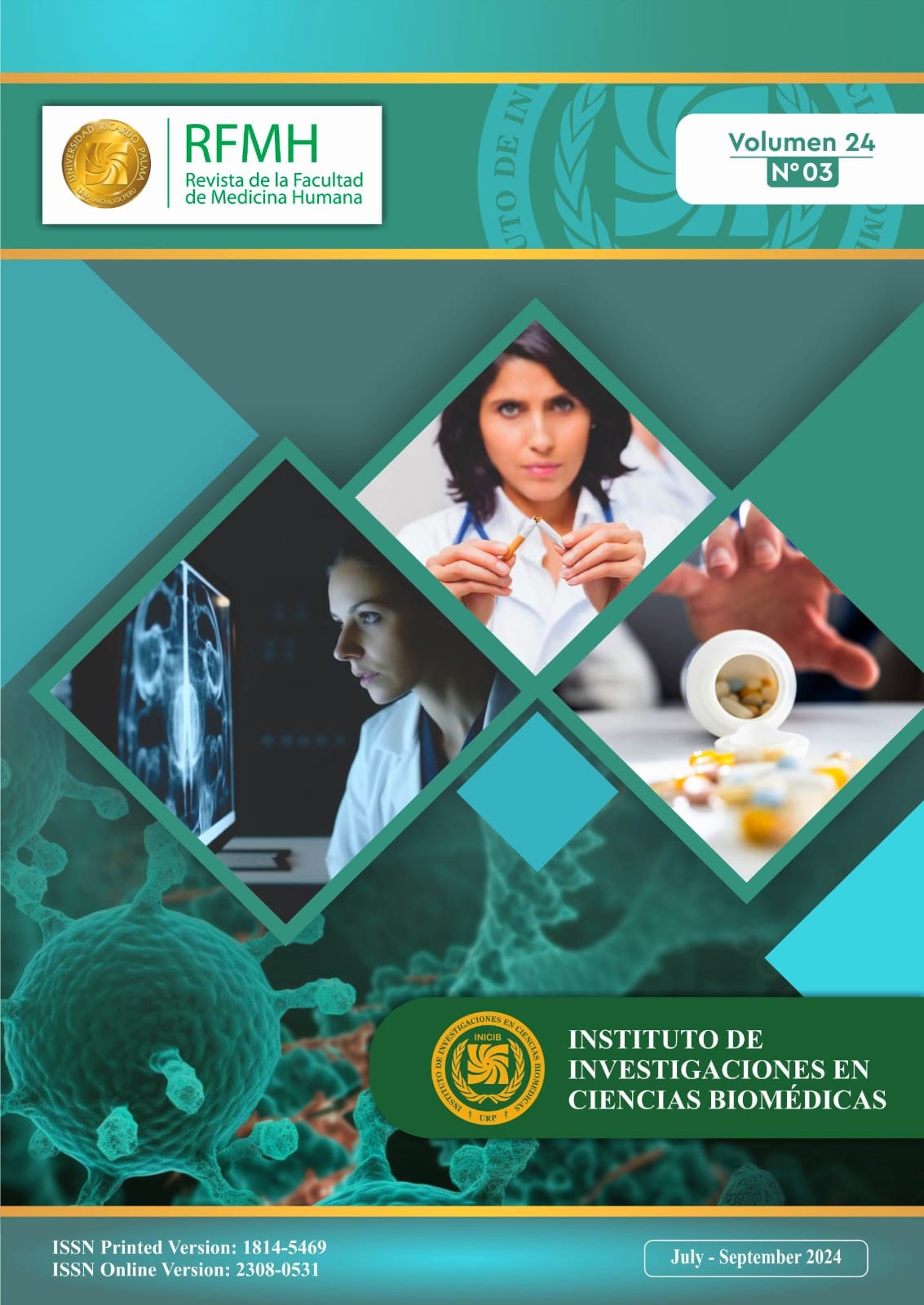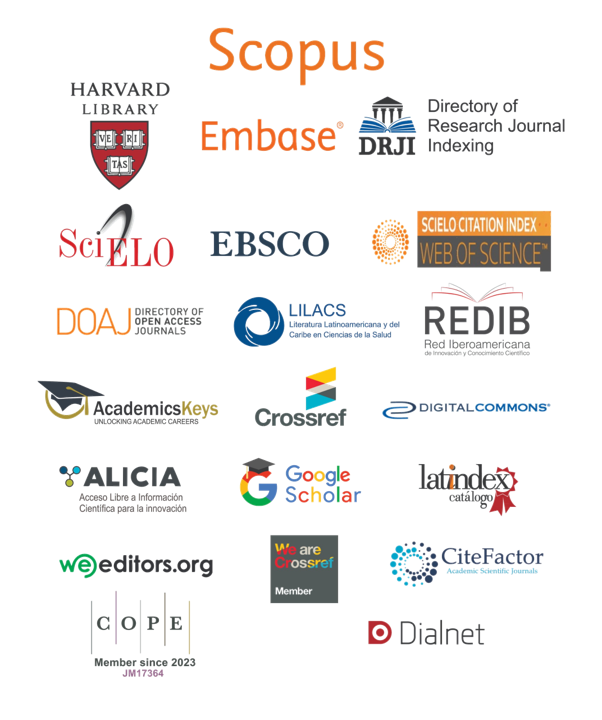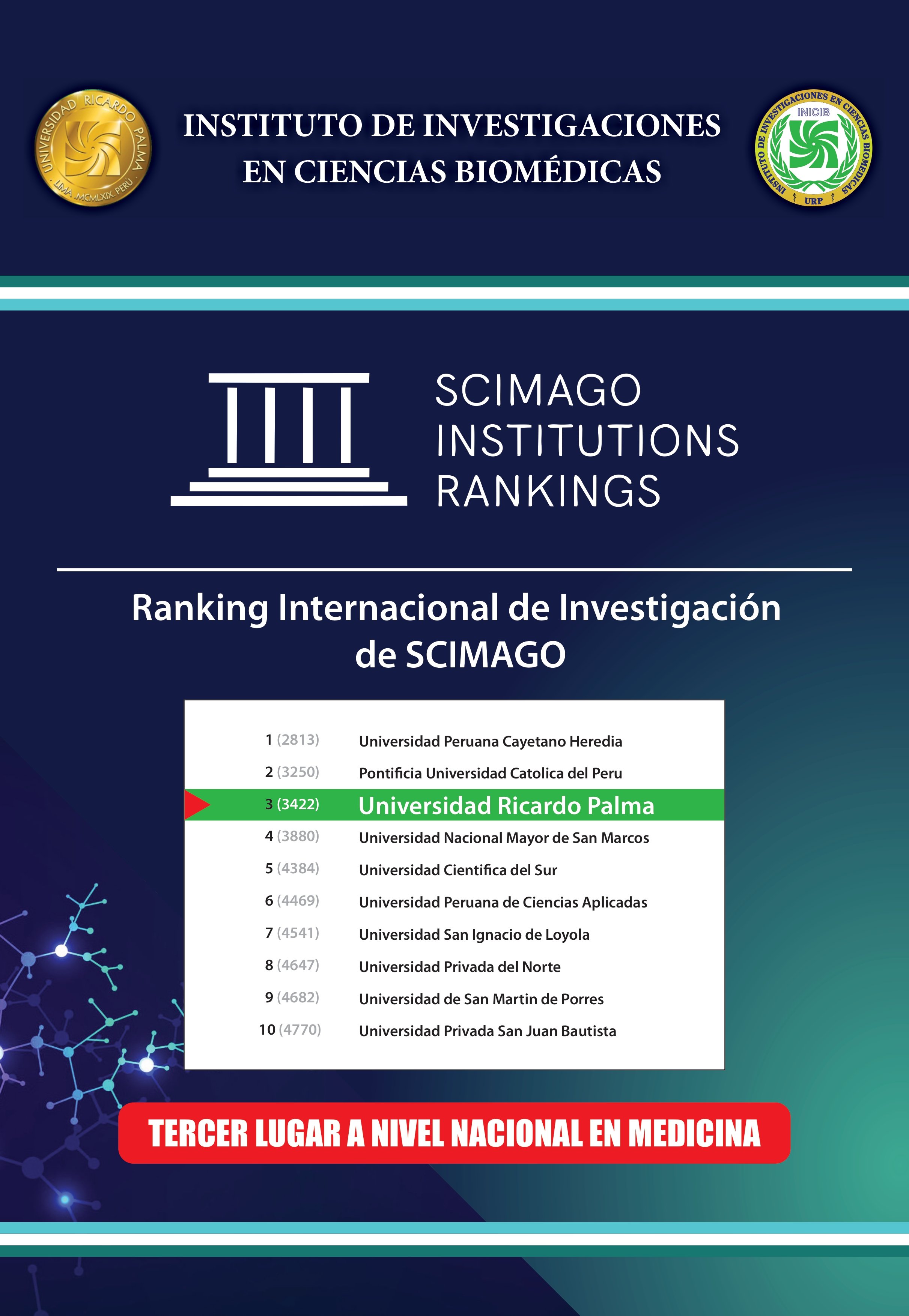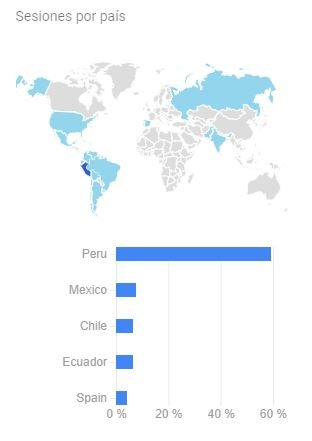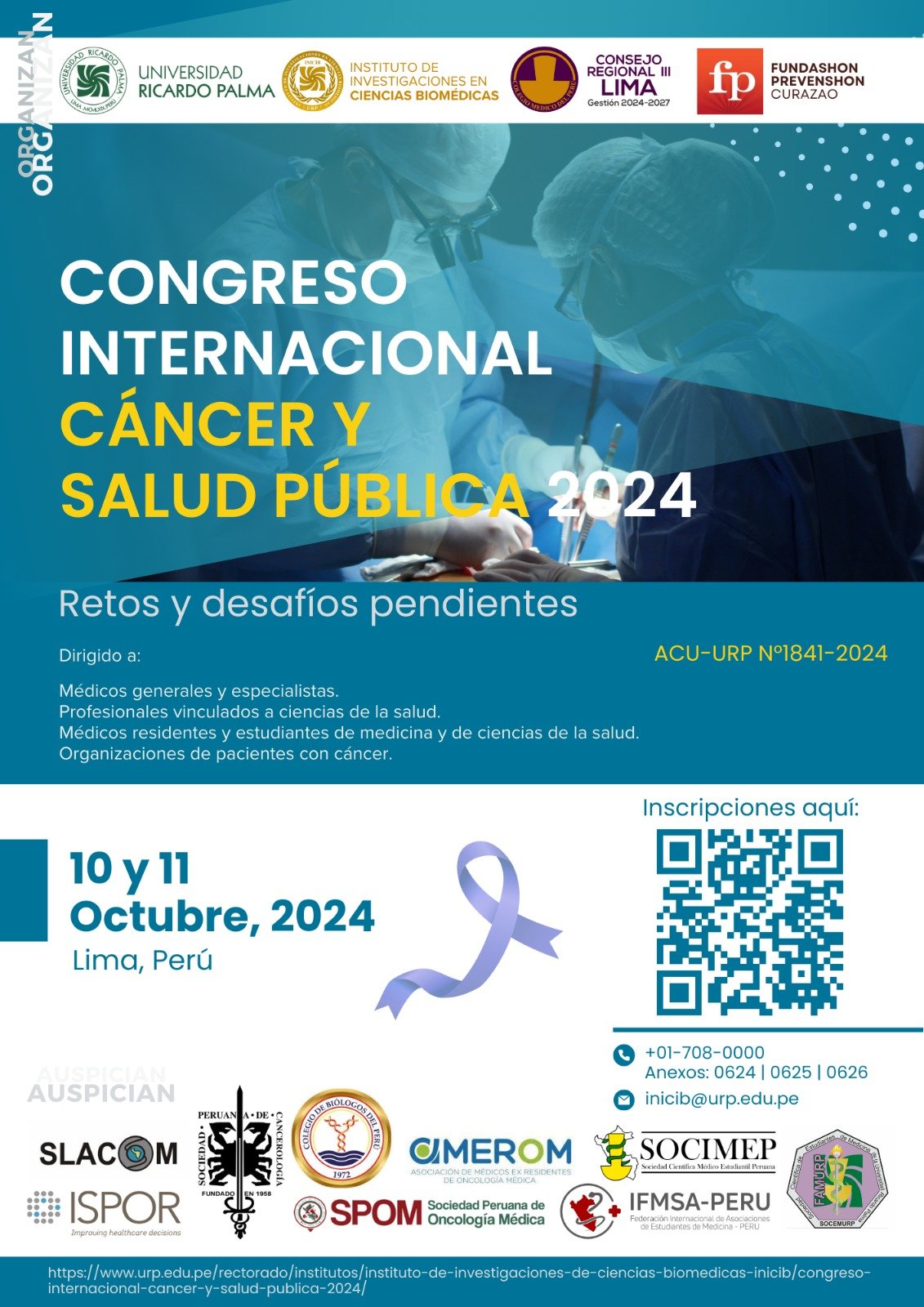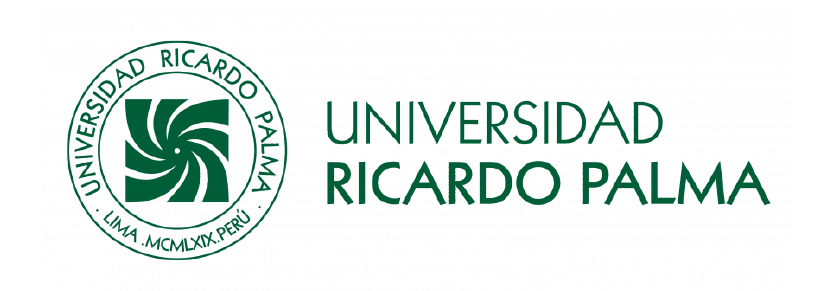Nivel de estrés y el uso de estrategias de afrontamiento de padres de niños autistas
Stress Level and the Use of Coping Strategies of Parents of Autistic Children | 自闭症儿童父母的压力水平及应对策略使用情况
DOI:
https://doi.org/10.25176/RFMH.v24i3.6606Palabras clave:
prejuicio de peso, estado nutricional, estudiantes del área de la saludResumen
Introducción: El trastorno del espectro autista es un trastorno del neurodesarrollo que como consecuencia tiene la alta demanda física, psíquica y económica por parte de los padres. Objetivo: Determinar la asociación entre el nivel de estrés y el uso de estrategias de afrontamiento de padres de niños autistas del instituto ARIE Villa El Salvador. Métodos: Estudio analítico cuantitativo observacional. Se utilizaron dos encuestas Cuestionario de estrés parental, versión española modificada CEP(PSI-SF) y Cuestionario abreviado de la Escala Multidimensional de Evaluación de los Estilos de Afrontamiento. Resultados: Se trabajó un total de 103 padres de familia. El nivel de estrés medio-alto fue 93,14%. De las estrategias de afrontamiento; la estrategia A la estrategia que tuvo mayor media fue la planificación (10.81 puntos), de la estrategia B la estrategia que tuvo mayor media fue la reinterpretación positiva y crecimiento (11.22 puntos), y de la estrategia C la estrategia que tuvo mayor media fue la desconexión mental (7.53 puntos). Se encontró una correlación positiva (0.86) entre el nivel de estrés y el Test de afrontamiento. En la regresión múltiple se observó que el nivel de estrés, aumenta 0.81 puntos (IC95%: 0.718-0.909; p<0,001) por cada punto que incrementa el test de afrontamiento. Además, se encontró una fuerza de asociación entre ambos de 0.7402. Conclusiones: existe asociación entre el nivel de estrés y el afrontamiento de este por los padres. Las estrategias con mayor puntuación fueron la planificación, la reinterpretación positiva y crecimiento, y la desconexión mental.
Descargas
Citas
Alza de obesidad en Chile: Advierten la urgencia de medidas frente a este
problema de salud pública [Internet]. Uchile.cl. 2022 [citado el 22 de
noviembre de 2023]. Disponible en: https://uchile.cl/noticias/193095/especialistas-abordan-preocupantes-cifras-
de-obesidad-en-chile
World Health Organization. (2020). Obesity and overweight. [ citado el 4 de
mayo, 2023] [disponible en internet] https://www.who.int/news-room/fact-
sheets/detail/obesity-and-overweight
Puhl RM, Heuer CA. The stigma of obesity: A review and update. Obesity
(Silver Spring) [Internet]. 2009;17(5):941–64. disponible en:
http://dx.doi.org/10.1038/oby.2008.636
Kim S-R, Kim H-N, Song S-W. Associations between mental health, quality
of life, and obesity/metabolic risk phenotypes. Metab Syndr Relat Disord
[Internet]. 2020;18(7):347–52. Available from:
http://dx.doi.org/10.1089/met.2020.0028
Tomiyama AJ, Carr D, Granberg EM, Major B, Robinson E, Sutin AR, et al.
How and why weight stigma drives the obesity ‘epidemic’ and harms health.
BMC Med [Internet]. 2018;16(1). Disponible en:
http://dx.doi.org/10.1186/s12916-018-1116-5
Hatzenbuehler ML, Keyes KM, Hasin DS. Associations between perceived
weight discrimination and the prevalence of psychiatric disorders in the
general population. Obesity (Silver Spring) [Internet]. 2009;17(11):2033–9.
Disponible en: http://dx.doi.org/10.1038/oby.2009.131
Ruckwongpatr K, Saffari M, Fung XCC, O’Brien KS, Chang Y-L, Lin Y-C, et
al. The mediation effect of perceived weight stigma in association between
weight status and eating disturbances among university students: is there
any gender difference? J Eat Disord [Internet]. 2022;10(1). Disponible en:
http://dx.doi.org/10.1186/s40337-022-00552-7.
Tapking C, Benner L, Hackbusch M, Schüler S, Tran D, Ottawa GB, et al.
Influence of body mass index and gender on stigmatization of obesity. Obes
Surg [Internet]. 2020;30(12):4926–34. Disponible en:
http://dx.doi.org/10.1007/s11695-020-04895-5
George TP, DeCristofaro C, Murphy PF. Unconscious weight bias among
nursing students: A descriptive study. Healthcare (Basel) [Internet].
;7(3):106. Disponible en: http://dx.doi.org/10.3390/healthcare7030106
Bastias-González F, Jorquera C, Matamala C, Aguirre P, Escandon-Nagel
N, Marileo L, et al. Weight stigma of nutrition and dietetics students towards
people with obesity. Rev Chil Nutr [Internet]. 2022;49(3):378–83. Disponible
en: http://dx.doi.org/10.4067/s0717-75182022000300378
Obara AA, Vivolo SRGF, Alvarenga M dos S. Preconceito relacionado ao
peso na conduta nutricional: um estudo com estudantes de nutrição. Cad
Saude Pública [Internet]. 2018;34(8). Disponible en:
http://dx.doi.org/10.1590/0102-311x00088017
Cuschieri S. The STROBE guidelines. Saudi J Anaesth [Internet].
;13(5):31. Disponible en: http://dx.doi.org/10.4103/sja.sja_543_18
Gómez Pérez D, Bastías González F, Ortiz Parada M. Weight stigma,
Mediterranean diet and obesity. Nutr Hosp [Internet]. 2022; Disponible en:
http://dx.doi.org/10.20960/nh.03908
Ercan A, Ok MA, Altun S. The impact of occupational education on obesity
prejudice of university students. Prog Nutr [Internet]. 2021 [cited 2023 Nov
;23(1):e2021017–e2021017. Available from:
https://doi.org/10.23751/pn.v23i1.8921
Hagen SJ, Henningfield MF. Health at Every Size principles: Clinician
perspectives to limit weight stigma in medical care. WMJ [Internet]. 2023
[cited 2023 Nov 16];122(4):277–9. Disponible en:
https://pubmed.ncbi.nlm.nih.gov/37768769/
Puhl RM, Lessard LM, Himmelstein MS, Foster GD. The roles of
experienced and internalized weight stigma in healthcare experiences:
Perspectives of adults engaged in weight management across six countries.
PLoS One [Internet]. 2021;16(6):e0251566. Disponible en:
http://dx.doi.org/10.1371/journal.pone.0251566
Lawrence BJ, Kerr D, Pollard CM, Theophilus M, Alexander E, Haywood D,
O'Connor M. Weight bias among health care professionals: A systematic
review and meta-analysis. Obesity (Silver Spring). 2021 Nov;29(11):1802-
doi: 10.1002/oby.23266. Epub 2021 Sep 6. PMID: 34490738.
Cardel MI, Newsome FA, Pearl RL, Ross KM, Dillard JR, Miller DR, Hayes
JF, Wilfley D, Keel PK, Dhurandhar EJ, Balantekin KN. Patient-Centered
Care for Obesity: How Health Care Providers Can Treat Obesity While
Actively Addressing Weight Stigma and Eating Disorder Risk. J Acad Nutr
Diet. 2022 Jun;122(6):1089-1098. doi: 10.1016/j.jand.2022.01.004. Epub
Jan 13. PMID: 35033698; PMCID: PMC10056599.
Jackson SE, Steptoe A. Obesity, perceived weight discrimination, and hair
cortisol: a population-based study. Psychoneuroendocrinology [Internet].
;98:67–73. Disponible en:
http://dx.doi.org/10.1016/j.psyneuen.2018.08.018
Cheng MY, Wang S-M, Lam YY, Luk HT, Man YC, Lin C-Y. The
relationships between weight bias, perceived weight stigma, eating
behavior, and psychological distress among undergraduate students in
Hong Kong. J Nerv Ment Dis [Internet]. 2018 [cited 2023 Nov
;206(9):705–10. Disponible en
Vilugrón Aravena F, Cortés M, Valenzuela J, Rojas C, Gutiérrez P. Obesity,
weight-related stigma and its association with the perception of quality of life
in Chilean university students. Nutr Hosp [Internet]. 2023 [cited 2023 Nov
;40(3). Disponible en: https://pubmed.ncbi.nlm.nih.gov/37073745/
Sattler KM, Deane FP, Tapsell L, Kelly PJ. Gender differences in the
relationship of weight-based stigmatization with motivation to exercise and
physical activity in overweight individuals. Health Psychol Open [Internet].
[cited 2023 Nov 16];5(1):205510291875969. Disponible en:
http://dx.doi.org/10.1177/2055102918759691
Gómez-Pérez D, Ortiz MS. Estigma de obesidad, cortisol e ingesta
alimentaria: un estudio experimental con mujeres. Rev Med Chil [Internet].
;147(3):314–21. Disponible en: http://dx.doi.org/10.4067/s0034-
Lin C-Y, Strong C, Latner JD, Lin Y-C, Tsai M-C, Cheung P. Mediated
effects of eating disturbances in the association of perceived weight stigma
and emotional distress. Eat Weight Disord [Internet]. 2020 [cited 2023 Nov
;25(2):509–18. Disponible en:

Descargas
Publicado
Cómo citar
Número
Sección
Licencia
Derechos de autor 2024 Revista de la Facultad de Medicina Humana

Esta obra está bajo una licencia internacional Creative Commons Atribución 4.0.



